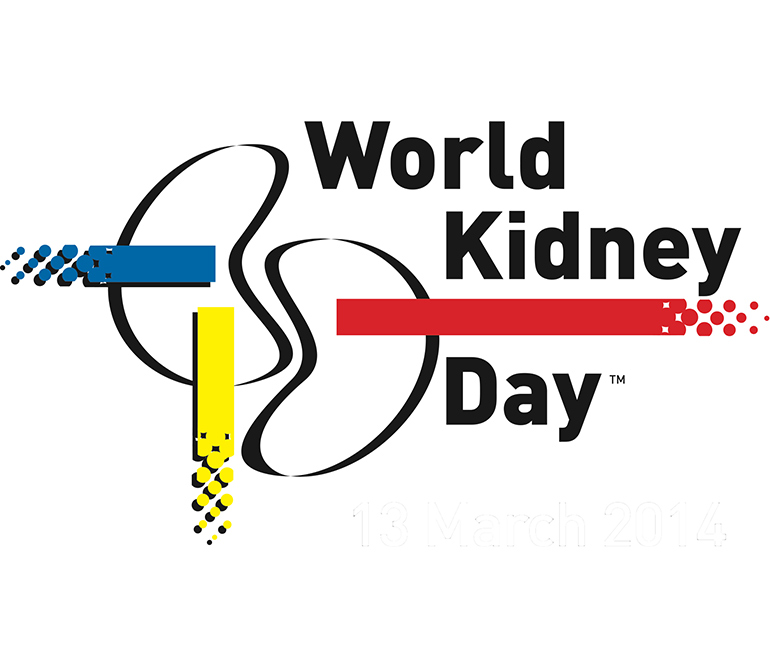 Created in 2006 as a joint initiative between the International Society of Nephrology and the International Federation of Kidney Foundations, World Kidney Day is designed as a health awareness campaign. At present, the date is observed in close to 100 countries around the world.
Created in 2006 as a joint initiative between the International Society of Nephrology and the International Federation of Kidney Foundations, World Kidney Day is designed as a health awareness campaign. At present, the date is observed in close to 100 countries around the world.
World Kidney Day aims to raise awareness of kidney-related diseases and of the overall importance of our kidneys to our health. It also tries to highlight preventive measures, in an attempt to reduce the frequency and impact of kidney disease and related health problems, on a global scale.
If it is detected early enough, Chronic Kidney Disease is treatable. However, CKD is becoming increasingly prevalent around the world. In addition to educating the public, World Kidney Day is designed to teach or remind medical professionals of the important role they can play in detecting problems and aims to encourage more systematic screening of patients with diabetes.
There are no warning signs for Chronic Kidney Disease and individuals can lose up to 90% of their kidney function before they feel any symptoms – and by then it’s too late.
Below are the lists of the Symptoms of reduced kidney function. It includes:
high blood pressure
changes in the amount and number of times urine is passed, e.g. at night
changes in the appearance of urine
blood in the urine
puffiness e.g. legs and ankles
pain in the kidney area
tiredness
loss of appetite
difficulty sleeping
headaches
lack of concentration
itching
shortness of breath
nausea and vomiting
bad breath and a metallic taste in the mouth
Here are some rules to keep your kidney healthy:
- Keep fit and active
- Increase daily physical activity as it helps reduce your blood pressure and reduces your risk of Chronic Kidney Disease.
- Maintain a healthy fluid intake and stay hydrated
- Fluid regulates your body’s temperature through perspiration; the kidney removes waste via urine and carries nutrients and other substances throughout the body. Fresh supplies of fluid are needed every day; however, there is no set amount to drink each day to avoid dehydration.
- Water is the recommended fluid to satisfy thirst and is nature’s choice – calorie-free, cheap, readily available. Listen to your thirst – and keep in mind that the right level of fluid intake for any individual depends on many factors including gender, exercise, climate, health conditions, pregnancy and breast feeding. People who have already had a kidney stone are advised to drink 2 to 3 liters of water daily to lessen the risk of forming a new stone
- Keep regular control of your blood sugar level.
- About half of people who have diabetes develop kidney damage. People with diabetes must ensure they have regular tests to check their kidney function. Kidney damage from diabetes can be reduced or prevented, if detected early.
- Monitor blood pressure, and take steps to lower it if necessary
- The lower your blood pressure, the slower will your kidney function decline. Although many people are aware that high blood pressure can lead to stroke or heart attack, few people know that high blood pressure is the most common cause of kidney damage.
- Eat healthy and keep your weight in check
- Help prevent diabetes, heart disease and other conditions associated with CKD by reducing salt intake – recommended 5-6 grams of salt per day (a teaspoon). In order to reduce salt intake, try to limit the amount of processed and restaurant food consumed and do not add salt to food.
- Do not smoke
- Smoking slows the flow of blood to the kidneys. Smoking limits the kidney’s ability to function properly as less blood reaches the kidneys, . Smoking also increases the risk of kidney cancer by about 50%! If you smoke, the best thing to do for best health is to quit, now!
- Do not take over-the-counter pills on a regular basis
- Common drugs such non-steroidal anti-inflammatory drugs are known to cause kidney damage and disease if taken regularly. Such medications may not pose significant danger if your kidneys are relatively healthy and you use these for emergencies only.
Reference: http://www.kidney.org.au/NewsEvents/WorldKidneyDay/tabid/655/Default.aspx
By:
Paola Hines
AB Mass Communication
New Era University







